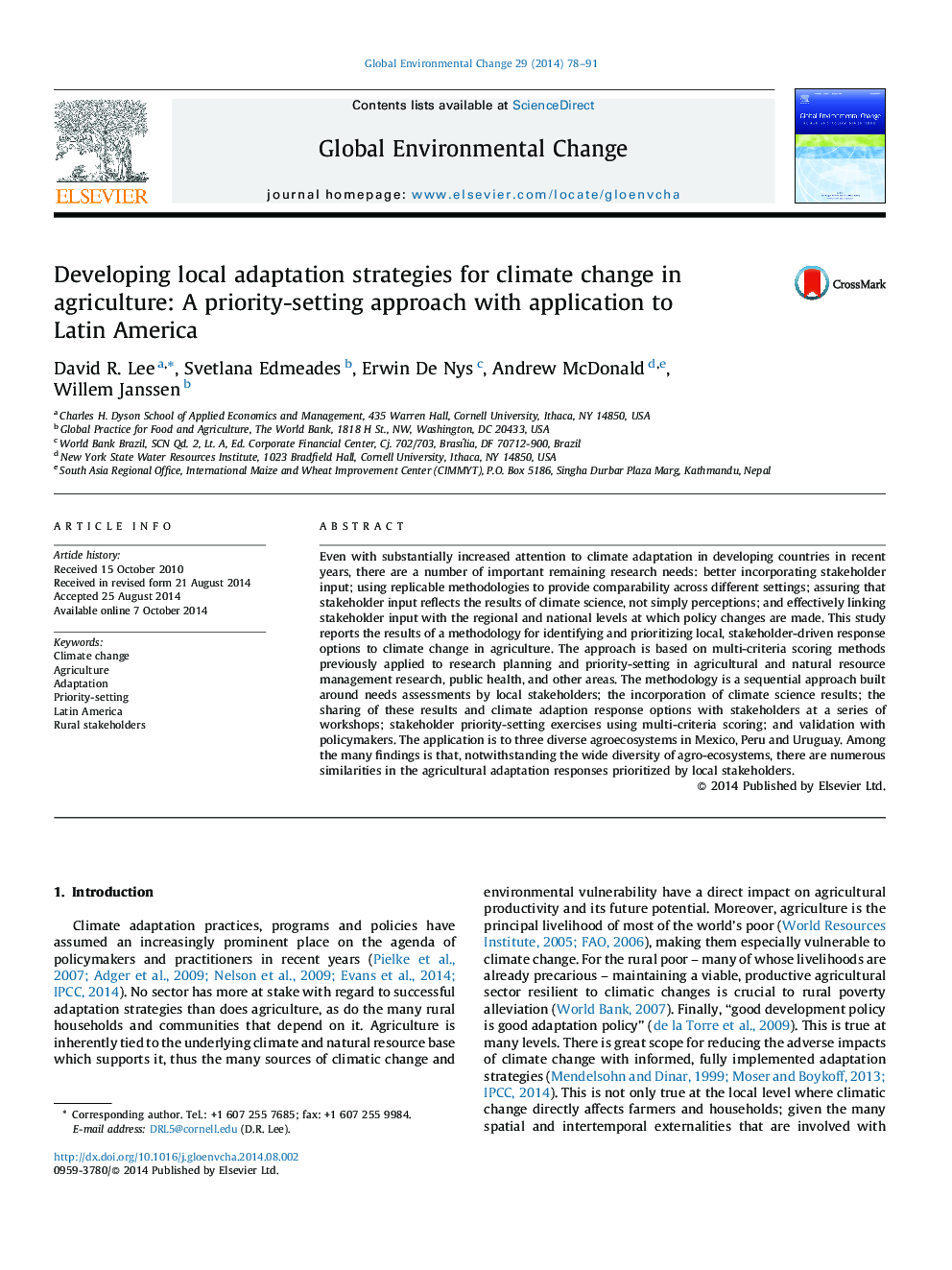| کد مقاله | کد نشریه | سال انتشار | مقاله انگلیسی | نسخه تمام متن |
|---|---|---|---|---|
| 7470236 | 1485129 | 2014 | 14 صفحه PDF | دانلود رایگان |
عنوان انگلیسی مقاله ISI
Developing local adaptation strategies for climate change in agriculture: A priority-setting approach with application to Latin America
ترجمه فارسی عنوان
توسعه استراتژی های انطباق محلی برای تغییرات اقلیمی در کشاورزی: یک رویکرد تنظیم اولویت با استفاده از آمریکای لاتین
دانلود مقاله + سفارش ترجمه
دانلود مقاله ISI انگلیسی
رایگان برای ایرانیان
کلمات کلیدی
تغییر آب و هوا، کشاورزی، انطباق، تعیین اولویت، آمریکای لاتین، ذینفعان روستایی،
ترجمه چکیده
حتی با توجه به شدت توجه به سازگاری آب و هوا در کشورهای در حال توسعه در سال های اخیر، تعدادی از نیازهای مهم تحقیق باقیمانده وجود دارد: بهتر شدن ورودی های ذینفعان؛ استفاده از روش های تکراری برای ارائه قابلیت مقایسه در تنظیمات مختلف. اطمینان از اینکه ورودی ذینفعان نتایج علم اقلیمی را نشان می دهد، نه تنها ادراکات؛ و به طور موثر درج لینک های ذینفع با سطوح منطقه ای و ملی که در آن تغییر سیاست ها ایجاد می شود. این مطالعه نتایج روش شناسی را برای شناسایی و اولویت بندی واکنش های محلی و متفاوتی جهت پاسخگویی به تغییرات اقلیمی در کشاورزی گزارش می دهد. این رویکرد بر مبنای روش های به ثمر رسیدن چندین معیار است که قبلا برای برنامه ریزی تحقیق و تعیین اولویت در تحقیقات مدیریت کشاورزی و منابع طبیعی، بهداشت عمومی و سایر مناطق مورد استفاده قرار گرفته است. روش شناسی یک رویکرد پیوسته است که بر مبنای نیازهای ارزیابی توسط سهامداران محلی ساخته شده است. پیوستن نتایج علمی علمی؛ به اشتراک گذاری این نتایج و گزینه های پاسخ سازگاری آب و هوا با ذینفعان در یک سری از کارگاه های آموزشی؛ تمرینات تنظیم اولویت ذینفعان با استفاده از نمرات چند معیار؛ و اعتبارسنجی با سیاستگذاران. این نرم افزار به سه دسته کشاورزی مختلف در مکزیک، پرو و اروگوئه می پردازد. در میان یافته های بسیاری این است که، با وجود تنوع وسیع اکوسیستم های زراعتی، در واکنش های سازگاری کشاورزی که توسط سهامداران محلی اولویت بندی می شوند، شباهت های فراوانی وجود دارد.
موضوعات مرتبط
علوم زیستی و بیوفناوری
علوم محیط زیست
علوم زیست محیطی (عمومی)
چکیده انگلیسی
Even with substantially increased attention to climate adaptation in developing countries in recent years, there are a number of important remaining research needs: better incorporating stakeholder input; using replicable methodologies to provide comparability across different settings; assuring that stakeholder input reflects the results of climate science, not simply perceptions; and effectively linking stakeholder input with the regional and national levels at which policy changes are made. This study reports the results of a methodology for identifying and prioritizing local, stakeholder-driven response options to climate change in agriculture. The approach is based on multi-criteria scoring methods previously applied to research planning and priority-setting in agricultural and natural resource management research, public health, and other areas. The methodology is a sequential approach built around needs assessments by local stakeholders; the incorporation of climate science results; the sharing of these results and climate adaption response options with stakeholders at a series of workshops; stakeholder priority-setting exercises using multi-criteria scoring; and validation with policymakers. The application is to three diverse agroecosystems in Mexico, Peru and Uruguay. Among the many findings is that, notwithstanding the wide diversity of agro-ecosystems, there are numerous similarities in the agricultural adaptation responses prioritized by local stakeholders.
ناشر
Database: Elsevier - ScienceDirect (ساینس دایرکت)
Journal: Global Environmental Change - Volume 29, November 2014, Pages 78-91
Journal: Global Environmental Change - Volume 29, November 2014, Pages 78-91
نویسندگان
David R. Lee, Svetlana Edmeades, Erwin De Nys, Andrew McDonald, Willem Janssen,
